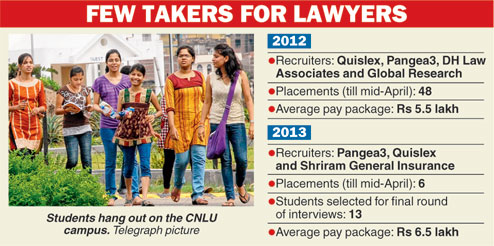 |
The slowdown of the Indian economy has reflected in the decreasing recruitment of Chanakya National Law University pass- outs with the numbers falling considerably from the last year.
Only six students have got jobs till now, while 16 more have been selected for final interview. Last year, the numbers were far higher. Eighty students will pass out this year.
Sources said Mumbai-based Panagea3 has offered jobs to three students at an annual package of Rs 6 lakh. Three others have got pre-placement calls — one from Mumbai-based Vidhii Partners and two from media houses.
Besides them, Hyderabad-based law firm Quislex Legal Services has shortlisted seven students for final interviews out of the 18 students who had taken a written test. Shriram General Insurance will also interview six students on Thursday.
CNLU placement co-ordinator Ajay Kumar said: “Till now, 19 out of 61 students, who enrolled for placements, are on the placement list. The final placement lists of other companies are yet to be declared and we are hopeful that more students would get jobs.”
He added that another law firm, LexisNexis India, and a non-government organisation, Cuts International, has also shown interest in hiring students from the CNLU.
Kumar also said the placement scenario this year was no better at other premier law institute. Most firms were hiring passouts on pre-placement offers. “In the pre-placement offer system, students are first hired by firms as interns and then absorbed based on their performance,” he said.
Smiriti Chudiwal, the final-year student who has received a placement offer from Vidhii Partners, said: “I was selected on the basis of my performance as an intern at the Mumbai-based firm.”
She said most firms wanted to hire students from reputed law universities in Delhi and Mumbai and were reluctant to recruit from new institutions like the CNLU, established in 2006.
There could be a number of other reasons for the low recruitment at the varsity, said Kumar. “Many companies are recruiting through lateral entry. Students, too, are not accepting offers that require them to sign two- or three-year contracts.”
But some students feel that the low placements also reflects the apathy of the state government and the university in helping them get jobs.
A final-year student, who did not want to be named, said: “The government feels that its duties are limited to opening the institute but it should also help students get jobs.”
The placement co-ordinator, however, said the university was focussing on producing law graduates who would join the bar rather than work for corporate firms.











